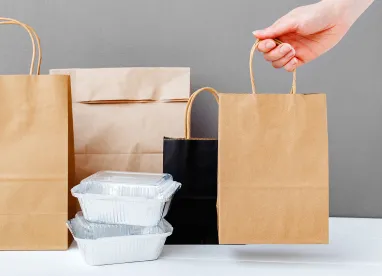Key Takeaways
-
What is Happening? On July 13, 2021, Maine became the first state to sign Extended Producer Responsibility (EPR) legislation into law for plastics and packaging materials, and Oregon may soon follow. This reflects a growing momentum towards EPR legislation nationwide. Several of these state bills require producers to pay for a portion of the costs of recycling materials that they put into the market.
-
Who Is Impacted? Producers, retailers, and manufacturers of single-use plastic, packaging materials, paper, and food service ware. This does not include producers of packaging material intended to be used for long-term storage or protection, beverage containers, or paint containers. There are also exceptions for producers of small amounts of packaging waste.
-
What Should I Do? Potentially impacted producers in Maine and Oregon should evaluate the new recycling requirements imposed by EPR legislation in each state. Producers, retailers, and manufacturers of single-use plastics and packaging material should begin to review their supply chains and develop plans to implement potential EPR responsibilities as more states turn to EPR policies as a way to promote sustainability.
EPR legislation places the responsibility for treatment and disposal of certain consumer products on producers, manufacturers, and retailers. EPR policies are gaining momentum as states are faced with an increasing amount of waste. States use EPR legislation to promote recycling efforts and require producers to develop takeback programs and more sustainable product designs. Several states have existing EPR programs for industries including pharmaceuticals, paint, batteries, and carpet. Now, states are developing policies for packaging more generally. EPR efforts related to packaging and plastics waste have been met with great success in some states, while others have seen little movement on proposed EPR legislation.
States that have Passed EPR Legislation for Packaging
Maine
On July 13, 2021, the governor of Maine signed into law LD 1541, making it the first state to enact an EPR bill for paper and packaging waste. The bill requires producers to finance stewardship organizations and thus bear more responsibility for the packaging they put into the market. These stewardship organizations are put in place to manage and help develop methods to collect and recycle products on the producers’ behalf.
The bill covers most packaging materials and contains exemptions for paint and beverage containers, small businesses, and low-volume packaging producers. The bill defines a low-volume producer as a producer that has distributed and sold more than one ton, but less than 15 tons of packaging material in a calendar year. The purpose is to incentivize producers to create packaging that can be easily recycled and contains more recycled content. The main function of the bill is to charge producers for the costs associated with managing and recycling packaging waste.
Oregon
The Oregon state legislature has passed its own EPR bill, SB 582 (the Plastic Pollution and Recycling Modernization Act), which is awaiting the Governor’s signature. The bill establishes an EPR program for plastic packaging, paper, and food service ware. The bill requires producers to join producer responsibility organizations (PROs) that will charge annual membership fees based on the environmental impacts of the producer’s products. The state will establish a collection list to standardize recycled items across the state and funding will go toward upgrading facilities to meet new performance standards. These facilities will be required to obtain a permit from Oregon’s Department of Environmental Quality (DEQ) to receive recyclable materials from various communities. PROs will also have a responsibility to create accessible educational resources for local governments to use to increase awareness of the state’s recycling initiatives.
Beyond making producers more accountable for their packaging content, the bill also makes recycling more accessible in Oregon’s rural communities. DEQ is developing an implementation plan that producers will be expected to execute beginning June 2022.
States with Proposed EPR Plastics and Packaging Bills
-
California – SB-54, Plastic Pollution Producer Responsibility Act. Places a responsibility on businesses selling plastic packaging products in California to ensure that packaging reduces waste and uses materials that are reusable, can be recycled, or are compostable. The bill has now gone dormant and is listed as an “inactive file.”
-
Hawaii – SB1419. Establishes a program making producers responsible for managing waste from their own products. These producers are expected to submit annual reports on plans to fulfill recycling requirements. There have been no developments since February 2021 when the bill was referred to a senate committee.
-
Maryland – HB 36. Requires producers to submit product stewardship plans to Maryland’s state environmental agency. By 2024, producers would be prohibited from selling or distributing plastic packaging, paper, and single-use paper products unless approved by the Maryland Department of Energy. The bill was scheduled to be heard in the House Environment and Transportation committee meeting in February 2021.
-
Massachusetts – S.610 / H.D. 1553. Requires producers of plastics, metal, paper, cartons, and glass to pay recovery costs for products based on a state-implemented system. The system establishes the amount producers are required to pay, which is determined by the net cost of recycling collection and processing costs. Retailers and distributors may not sell, offer for sale, use, or distribute covered materials if the producer of the material is not in compliance with the bill. If a producer, retailer, distributor, or any other responsible party violates any section of the bill, they are subject to fines for each day a violation occurs. There has been no recent development or movement toward having this bill enacted.
-
New York – S1185A. Requires producers of packaging and paper products to develop and implement strategies to promote recycling. Also imposes restrictions on particular materials within three years of the bill’s passage unless the producers have an approved state plan with exceptions to those materials. The bill is currently in the senate rules committee.
Similar to the Maine and Oregon bills, these proposed bills would establish EPR programs for producers to pay into.
What Does This Mean for the Future?
The recently proposed and passed state EPR regulations generally affect the plastics and product packaging industry. Some states are moving toward incentivizing producers to form PROs and to make payments to the PRO to offset consumers’ and the state’s expenses of recycling and recovery plans. Producers, manufacturers, and retailers are likely to face increased responsibility for their waste on the state and federal levels in the future as efforts to achieve a circular economy become more widespread. Producers, manufacturers, and retailers of plastics and packaging should continue to keep an eye out for developments in EPR policies within their own states. Ultimately, producers, manufacturers, and retailers will need to develop a plan to incorporate more recycled materials and make packaging more sustainable. Beveridge & Diamond will continue to track, update, and help our clients comply with these evolving requirements.
|
|
|
|
|||||||||
|---|---|---|---|---|---|---|---|---|---|---|---|---|
|
California |
Inactive |
|
|
|||||||||
|
Referred to a senate committee in February 2021 |
Producers |
|
|||||||||
|
Maine |
Signed into law |
Paper and packaging producers |
|
|||||||||
|
Scheduled for a hearing in the House Environment and Transportation Committee meeting in February 2021 |
Producers |
|
|||||||||
|
Referred to the House Committee on Environment, Natural Resources, and Agriculture in March 2021 |
Producers, retailers, and distributors of plastics, metal, paper, cartons, and glass |
Requires producers to pay recovery costs for products based on a state-implemented system. The system establishes the amount producers are required to pay, which is determined by the net cost of recycling collection and processing costs. |
|||||||||
|
New York |
In Senate Rules Committee |
Producers of packaging and paper products |
Requires producers to develop and implement strategies to promote recycling. Also imposes restrictions on particular materials within three years of the bill’s passage unless the producers have an approved state plan with exceptions to those materials. |
|||||||||
|
Oregon |
Awaiting Governor’s signature |
Plastic packaging, paper, and food service ware producers |
Requires producers to join PROs and allocates funds to upgrade recycling facilities. Also standardizes materials recycled across the state. |
Co-authored by Leigh Barton & Clirae Bourke (Summer Associate)





 />i
/>i

